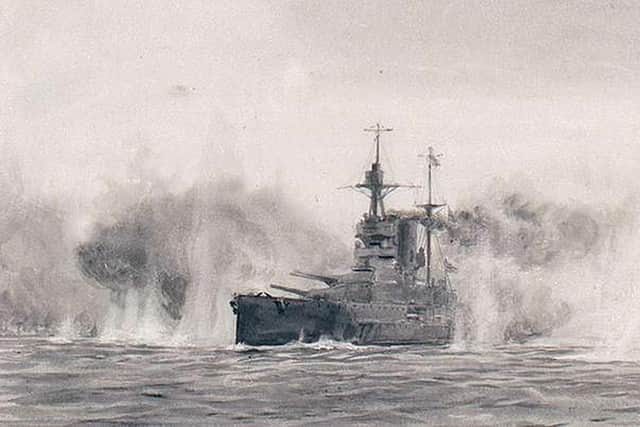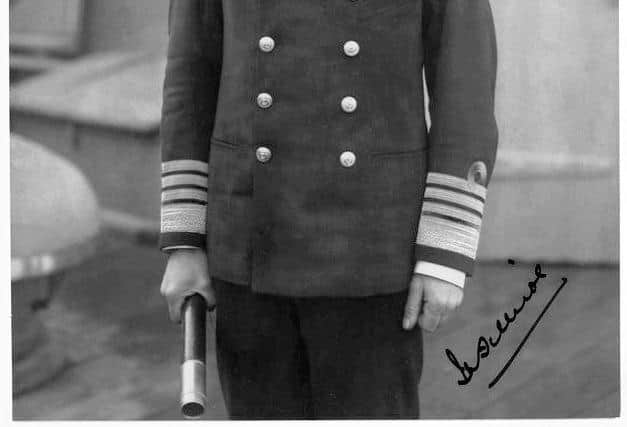Historical fund throws 200,000 Scottish sailors, their wives and children a lifeline this Christmas
As he sat on his dreadnought battleship in Scapa Flow, the mind of Admiral John Jellicoe was fixed not only on the fact that he was considered the only man who could lose the war in an afternoon but on the fate that awaited his men – and their families back home – as the deadly Battle of Jutland brewed in the North Sea.
In that moment on the HMS Iron Duke, the Commander- in- Chief of the British Grand Fleet set up a benevolent fund for sailors and their loved ones and chucked in £50 – around £4,000 today – to help sailors and their loved ones rebuild their lives following what became the largest naval battle of World War One.


Advertisement
Hide AdAdvertisement
Hide AdIndeed, the need was plenty. Just under 6,100 British men were killed in the 1916 battle which affected some communities as badly as the worst land battles of the war. When the news of the sinking of the British battlecruisers reached Wick in Caithness, the blinds of many houses were drawn in Pulteneytown, the fisherman’s quarter where many seamen were called up to man the warships. The battle left 13 widows and 33 fatherless children here alone.
Admiral Jellicoe’s £50 was the beginning of the Grand Fleet Fund, which later became the Royal Naval Benevolent Trust in 1922. Now, more than 100 years on, that same fund is still helping those who have served – and those closest to them.
Rob Bosshardt, chief executive of the RNBF, said the trust has around £3m available a year to support the ‘naval family’ with and estimated 200,000 serving sailors, veterans and family members in Scotland able to access financial help.


The trust does today what Admiral Jellicoe started in Scapa Flow in 1916, he added.
Mr Bosshardt said: Jellicoe could clearly see this was going to be a high intensity naval battle with huge number of casualties probably on both sides and he worried about the sailors and their families so he set up the Grand Fleet Fund. The fund was for the men.
“He then chipped in 50 quid of his own money which is worth just short of £4,000 in today money, so there is a man with the weight of responsibility of being, as Churchill said, the only man on either side who could lose the war in an afternoon
"And yet he is worrying about the men and his families, he organises the first meeting and he puts in some of his own money – so how far ahead of his time was he?
"Here we are more than 100 years later still doing exactly what he intended. So we feel the weight of history but also here we are doing charitable activities amid the cost of living crisis in 2023. That continuity of support is the ongoing theme.”
Advertisement
Hide AdAdvertisement
Hide AdThe trust, which has long operated in Scotland, has recently been registered with charity regulators north of the border in a bid to increase awareness and reach of its work in Scotland which has a high volume of Royal Navy personnel and Royal Marines given the surface fleet’s links to Rosyth, the submarine base at Faslane and the Royal Marine 45 Commando at Arbroath.
Mr Bosshardt added: “We operate significantly in Scotland and actually, per head of population , we probably do more business in Scotland than the rest of the UK.
“We help those in need, those in distress and those who have hit hard times. That obviously happens every year but we have seen an increase in demand, both this year and last. This year we are 10 per cent up in applications from last and 20 per cent on applications the year before, so that shows the impact of the cost of living crisis on people
"We are spending a lot more on life’s essentials, on food, on children’s clothing, on rent and energy costs. We see all those aspects coming through. We do do other more steady applications for help with house adaptations, house repairs with mobility assistance and care home top up fees.”
“It is a story of continuous and sustained support for the naval community, from that first day in Scapa Flow to today. That has obviously taken us through the Great Depression, the World War, the Korean War and everything in between.”
John Brown, a former Royal Naval sonar and air weapons operator, of Dunfermline, is a recent beneficiary of funds that helped him build a “magical and life-changing” space in at home for his son Finlay, 14, who has severe physical and learning disabilities.
Mr Brown and his wife received a grant of £10,000 from the RNBT towards an extension with downstairs bedroom and ensuite wet room for Fin.
The naval veteran, who signed up for service aged 18, said: “It has been life changing – and I mean life changing.
Advertisement
Hide AdAdvertisement
Hide Ad“I will be eternally grateful to the RNBT. We have this magical and life changing space. I just don’t know how we would have got through the last few years without it.”
Mr Bosshardt said those who had served in the Royal Navy and Royal Marines tended to be “proud” people who may find it difficult to ask for help.
He added: “If you are in trouble, get in touch and that I suppose is one of our challenges. People who have served in the navy and the Royal Marines tend to be proud and self sufficient people, they are not going to find it easy to make that first call but if they do make a call to us, our grants team, who have all served in the Royal Navy or the Royal Marines, speak your language straight away.
"We also want to encourage people and to look out for other people they might know, perhaps someone who is a widow of someone who served in the Royal Navy who might not necessarily think of coming to a service charity to help, but they are still so much part of the naval family and so it takes other people to look out for them and make sure they get the support they need.”
He added: “Our saying is ‘serve a day, supported for life’
Comments
Want to join the conversation? Please or to comment on this article.
